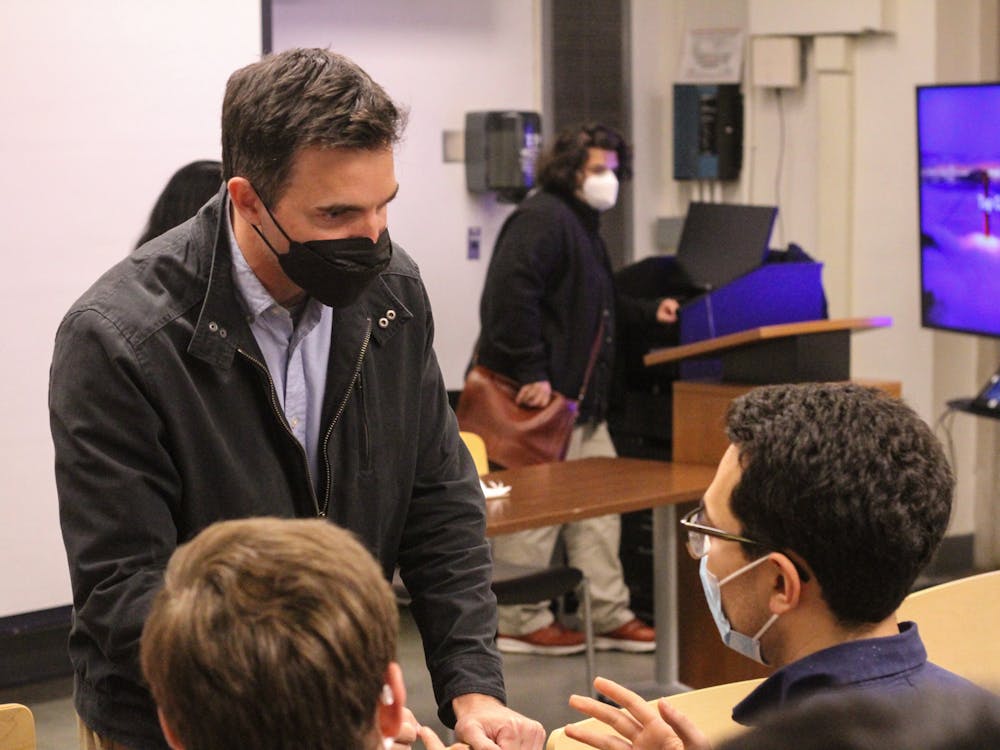In 2014, Jeff Jackson was a prosecutor in Gaston County. That same year, he would become a state senator after Sen. Dan Clodfelter was appointed mayor of Charlotte.
Now, Jackson is vying to represent North Carolina in the U.S. Senate, a move he first considered after the 2020 presidential election but fully decided to pursue after the Jan. 6 insurrection.
The Charlotte native described himself as a “reasonable and decent” person in an interview with The Chronicle. With a campaign focused on transparency and his core value of honesty, Jackson hopes to give more power to voters across the state and produce a strong climate plan if elected to the seat.
The ‘day one priority’
When asked about two or three key policies in his campaign, Jackson highlighted a new Voting Rights Act as his “day one priority.” The act would include three key features: end gerrymandering, pass the John Lewis Voting Rights Act to oppose voter suppression and pass the DISCLOSE Act to combat dark money and Citizens United, which freed corporations to spend money on election communications and advocate for the election or defeat of political candidates.
“The day one priority is making sure that you just have more power as voters. Particularly in North Carolina, gerrymandering is happening right now,” Jackson said, noting that new General Assembly maps have “rendered the vast majority of the state uncompetitive.”
“You just get worse politicians that way,” he said.
Jackson is also releasing his climate plan Tuesday, which he described as “another big, big priority” for the campaign.
Locally, Jackson noted that a large part of the conversation the last time he came to Durham—as well as in urban areas across the state—was affordable housing, something he hopes to include in his campaign.
The state senator is also a former member of the Army Reserve and current member of the Army National Guard. His experiences losing several friends in the military to suicide inspired a detailed policy position with respect to veteran mental health early on in his campaign.
“I don’t think the Army and the military do a very good job with respect to suicide prevention or mental health treatment,” he said. “So we’ve got some ideas on how to improve there. It’s not PowerPoint plans, which is what the Army does right now.”
Honesty and decency
When asked if he would describe himself as a progressive, Jackson said he would “describe [himself] as a reasonable and decent person.” He said the term was “super elastic” at this point, noting that many Democrats who run for president refer to themselves as progressive.
“I just want people to take 30 seconds to read about me and come to their own conclusions,” he said.
Jackson also elaborated on his personal principles, the main two being honesty and decency. He said the reason we’re in “such a dark political moment” is because those principles have been pushed to the side by candidates. By campaigning on them, Jackson says he is “making them explicit things that I will commit to defending.”
Jackson and his team are completing a 100 county campaign, hosting town halls in every single county where anyone can come and ask questions. He’ll host 140 town halls total during his campaign, which he says is more than any other Senate campaign in the country. Ultimately, Jackson wants to run “the most transparent campaign in the history of the state: not just because it’s the right thing to do, but because it’s the only way to win.”
“If you only communicate with people through television ads, you are incredibly vulnerable to misinformation in the homestretch,” he said. “But if you've been to their county two or three times, people have a sense of who you are as a person. That's the best defense against misinformation.”
He also feels he needs to perform very well in urban areas but feels “poised to do that” as a state senator from Charlotte.
Jackson’s stop at Duke is part of his transparency initiative, but it’s also part of his goal to include young voters as a “serious part of the campaign.” He said he’s going to 20 different colleges between now and Thanksgiving.
When asked about how he plans to encourage Duke students to get out and vote—often a struggle in local races—Jackson said it’s “not [his] job to tell Duke students what to care about.”
“It’s my job to bring our campaign here in a way that’s transparent and authentic and show them something that earns their support.”
Get The Chronicle straight to your inbox
Sign up for our weekly newsletter. Cancel at any time.

Leah Boyd is a Pratt senior and a social chair of The Chronicle's 118th volume. She was previously editor-in-chief for Volume 117.

